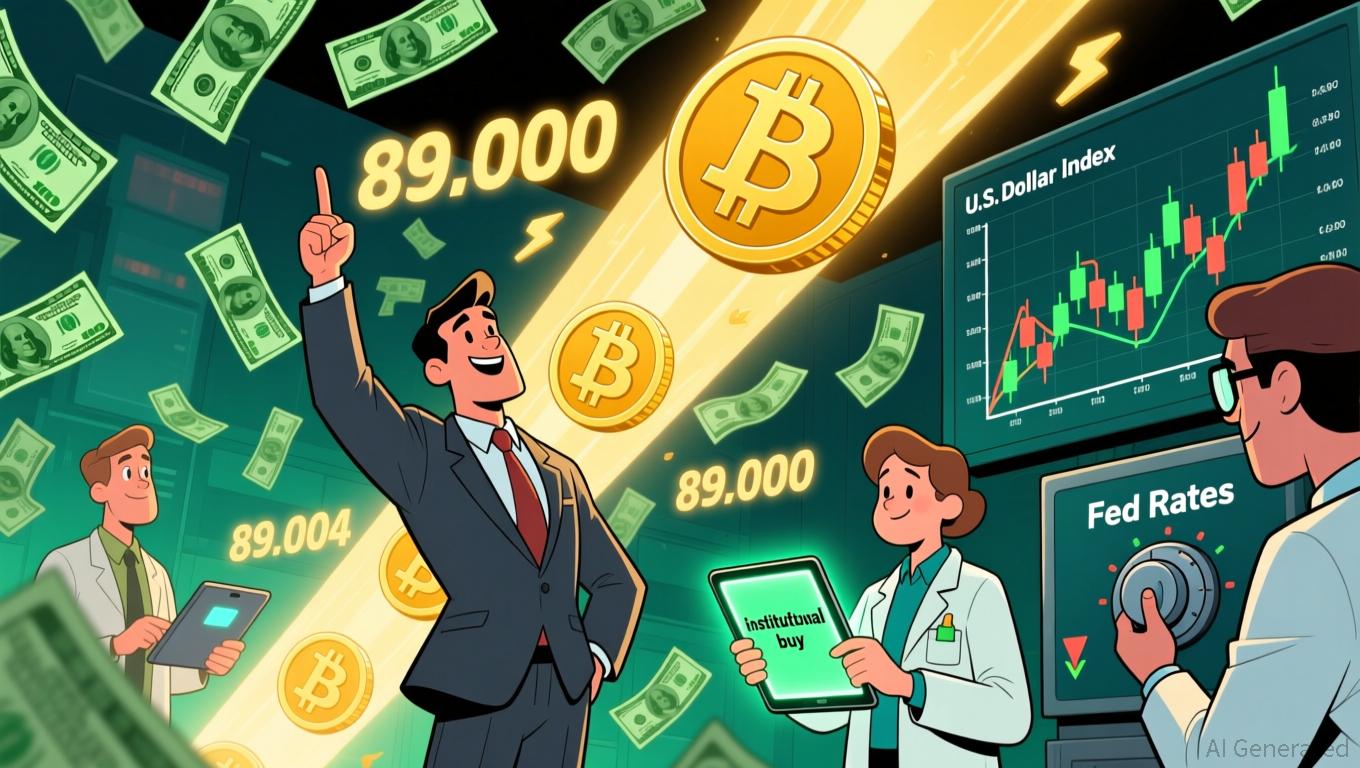The Psychological Factors Influencing Retail Investors’ Actions in Cryptocurrency Markets
- Crypto markets are shaped by behavioral finance, where retail investors drive volatility through FOMO, herd behavior, and overconfidence. - The PENGU token exemplifies this dynamic, surging 480% in July 2025 but plummeting 28.5% by October due to emotional trading cycles. - Social media amplifies emotional contagion, with traders checking prices 14.5 times daily, while financial literacy mitigates bias susceptibility. - Personality traits like neuroticism increase cognitive biases, and speculative narrat
The Psychology Behind Crypto Market Volatility
Cryptocurrency markets are a fascinating case study in behavioral finance, where investor emotions and cognitive biases often take center stage. Unlike traditional financial assets, digital currencies operate around the clock, lack established valuation models, and are heavily influenced by the rapid spread of information on social media. This creates an environment where individual traders—motivated by fear of missing out (FOMO), crowd mentality, and overconfidence—can have a greater impact on price movements than broader economic indicators. The rise and fall of the Pudgy Penguins (PENGU) meme coin, which is linked to the NFT sector, is a prime example of how psychological factors can fuel dramatic swings and irrational market behavior.
Understanding Behavioral Finance in Crypto
Behavioral finance suggests that investors frequently act on emotion rather than logic. In the world of cryptocurrencies, this tendency is heightened by unclear regulations and the lure of quick profits. Research consistently shows that retail crypto investors are especially swayed by social trends and emotional cues. For example, a 2025 study on Bitcoin revealed that market sentiment can significantly influence prices, though this effect is less pronounced among those with higher financial knowledge. Investors with limited financial education are more likely to fall prey to biases such as loss aversion and confirmation bias, leading to impulsive trading decisions.
The journey of the PENGU token in 2025 highlights these dynamics. In July, PENGU’s value soared by 480% to reach $0.041, propelled by endorsements from online personalities and the expansion of the Solana ecosystem. However, by October, the token had dropped by 28.5% as panic selling set in. This pattern of sharp rises and steep declines is not random; it is driven by psychological triggers like FOMO and herd mentality, where investors often buy at market highs and sell during downturns.
The Impact of Social Media and Herd Mentality
Social media platforms intensify emotional trading behaviors. According to a 2025 report, crypto traders check market prices an average of 14.5 times per day, with many displaying signs of compulsive behavior. This constant engagement can lead to a strong identification with investments, causing financial losses to feel like personal setbacks. In the case of PENGU, community sentiment often outweighs the token’s practical utility, with price movements reflecting collective beliefs rather than intrinsic value.
Herd behavior further amplifies market swings. When PENGU peaked at $0.045 in July 2025, a surge of retail investors jumped in, reinforcing the upward trend. Conversely, when the price fell below $0.023 in October, widespread fear triggered a wave of selling. This cycle of exuberance followed by panic is typical of speculative assets, where psychological influences often overshadow fundamental analysis.

The Protective Role of Financial Literacy
Financial education can help shield investors from emotional pitfalls. Studies indicate that those with a stronger grasp of financial concepts are better equipped to handle the unpredictable nature of crypto markets. In more developed economies, clear regulations and investor education have led to more cautious trading behaviors, while in emerging markets, emotional reactions to price changes are more pronounced.
Nonetheless, even knowledgeable investors face uncertainty. The practical uses of PENGU within the Pudgy World ecosystem—such as its integration with Pudgy Party and potential collaborations with major brands—remain unclear. This lack of concrete information forces investors to rely on speculation, leaving room for cognitive biases to influence decisions.
How Personality and Biases Shape Investment Choices
Individual personality traits also play a significant role in trading behavior. For instance, people who are more open to new experiences or prone to anxiety may be more vulnerable to biases like the disposition effect (selling winners too soon and holding onto losers) and anchoring (fixating on specific price levels). These tendencies are especially relevant in the fast-moving crypto space, where frequent price changes can prompt irrational actions.
Forecasts for PENGU’s 2025 performance illustrate these psychological dynamics. While some platforms, such as CoinDCX, predict an average price of $0.068, others like CoinEdition offer a more conservative estimate of $0.0150. These wide-ranging predictions reflect confirmation bias, as investors tend to favor information that supports their existing views.
Conclusion: Mastering the Emotional Landscape of Crypto
The story of PENGU is a microcosm of the larger crypto market, where behavioral finance principles are on full display. Emotional reactions, amplified by social media and ingrained biases, often drive price movements more than underlying fundamentals. For individual investors, success in this arena requires not only financial knowledge but also the ability to manage one’s emotions. Recognizing and addressing personal biases—whether it’s FOMO, overconfidence, or fear of loss—is just as important as technical analysis or staying informed about market news.
As new regulations such as the GENIUS Act and MiCA are introduced, they may help moderate some of the market’s more extreme behaviors. Until then, the crypto landscape will continue to reflect the complexities of human psychology, with every rally and crash telling a story of ambition, anxiety, and the ongoing search for the next big opportunity.
Disclaimer: The content of this article solely reflects the author's opinion and does not represent the platform in any capacity. This article is not intended to serve as a reference for making investment decisions.
You may also like
Bhutan allocates $970K in Ethereum for staking

Bitcoin Updates: Institutional Investors Return and Soft Policy Hints Drive Bitcoin's Significant Recovery
- Bitcoin surged above $89,000 in late November 2025, reversing a six-month low amid institutional reentry and macroeconomic optimism. - Fed rate-cut expectations (84% for December) and $238M Bitcoin ETF inflows fueled dollar weakness and crypto demand. - Coinbase's 22-day negative premium reversed, signaling easing institutional selling pressure and potential trend reversal. - Solana's $145 slump highlighted crypto divergence, while Bitcoin's $100,000 support and open interest dynamics indicated bearish e

Artificial Intelligence Applications in Biomedical Studies and Their Impact on Investment
- AI is revolutionizing drug discovery by accelerating timelines and reducing costs in pharmaceutical R&D. - Companies like Insilico Medicine and Exscientia use AI to cut drug development cycles by 70% and reduce compound testing, advancing candidates to clinical trials rapidly. - The AI-driven biotech market is projected to reach $350–410 billion annually by 2025, offering investment opportunities in AI-native firms and infrastructure providers. - However, regulatory challenges and the lack of approved AI

Internet Computer’s Latest Rally: Driven by Network Enhancements and Growing Institutional Interest
- Internet Computer (ICP) surged in 2025 due to technical upgrades, institutional partnerships, and speculative trading. - Fission/Stellarator boosted capacity by 50%, while Meridian/Flux aim to enhance cross-chain interoperability and scalability. - Q3 2025 saw $1.14B trading volume but 22.4% DApp engagement drop, highlighting infrastructure-user adoption disconnect. - TVL discrepancies ($237B vs. $1.14B) and reliance on institutional capital raise sustainability concerns amid inflated metrics. - Partners
